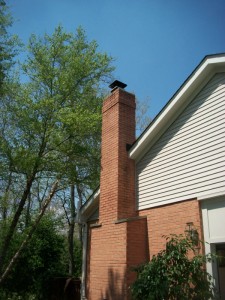Many of areas of the country have already seen measurable snowfall, which means winter is close behind. Weather experts, including the Old Farmer’s Almanac, have forecasted a winter just as frigid as the previous. Because of this, people have rightly begun preparing for the upcoming cold months. Wrapping up in a jacket and scarf may suffice for going outside, but staying warm inside is another matter entirely. For some homeowners, part of the heating regimen may include lighting a fire in the wood stove or the fireplace. Along with having the advantages of a fireplace, these homeowners also have the responsibility of properly maintaining it.
 Every year experts recommend having the chimney of your stove or fireplace swept and inspected. There are numerous reasons for both practices, but one major objective is to rid the chimney of any obstructions. Right around this time of year, as the temperatures start to fall and everyone heads inside, the little critters in the neighborhood also begin looking for a cozy spot to hunker down for the winter. After you have lit a fire or two in your fireplace, these birds or squirrels or raccoons quickly recognize the warm flue as the perfect place to stay.
Every year experts recommend having the chimney of your stove or fireplace swept and inspected. There are numerous reasons for both practices, but one major objective is to rid the chimney of any obstructions. Right around this time of year, as the temperatures start to fall and everyone heads inside, the little critters in the neighborhood also begin looking for a cozy spot to hunker down for the winter. After you have lit a fire or two in your fireplace, these birds or squirrels or raccoons quickly recognize the warm flue as the perfect place to stay.
Unfortunately for all parties involved, an animal living in the chimney does not make for a safe situation. The purpose of a chimney is to vent the smoke and other toxic fumes created by the fire out of the house. When an animal blocks the air flow in the chimney, the chimney cannot function properly. In addition, the animal is likely to build a nest, causing further obstruction in the chimney. As the smoke and other gases flow up the chimney and hit the obstruction, they have no choice but to backtrack into the house.
Having gases from the fire infiltrate your house poses serious danger to your health. No matter what type of fuel you burn, the fire always creates carbon monoxide. This poisonous gas can lead to loss of consciousness and even death in a matter of minutes. Wood-burning fires create a by-product called creosote, which makes up the messy soot that coats the inside of the chimney. Along with being messy and frustrating to clean, the black substance also causes a number of cancers, making it very dangerous.
While you may hope the animal that lives in your chimney decides to leave, more often than not, the animal dies of smoke or carbon monoxide inhalation. At this point, it can no longer willingly leave the chimney, making it imperative to have regular inspections and sweeps to check for this exact situation. Your health and safety depends on keeping animals out of your chimney, so call for an inspection today. If you live in upstate South Carolina, you can contact Blue Sky Chimney Sweeps for a professional consultation.
